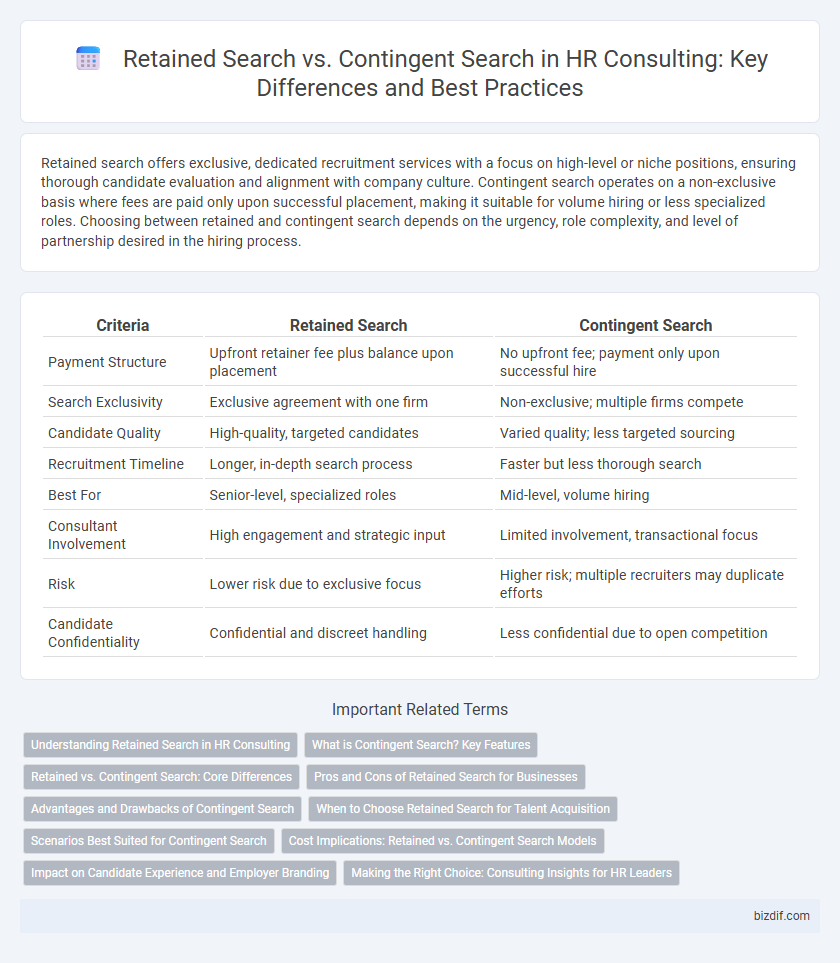Retained search offers exclusive, dedicated recruitment services with a focus on high-level or niche positions, ensuring thorough candidate evaluation and alignment with company culture. Contingent search operates on a non-exclusive basis where fees are paid only upon successful placement, making it suitable for volume hiring or less specialized roles. Choosing between retained and contingent search depends on the urgency, role complexity, and level of partnership desired in the hiring process.
Table of Comparison
| Criteria | Retained Search | Contingent Search |
|---|---|---|
| Payment Structure | Upfront retainer fee plus balance upon placement | No upfront fee; payment only upon successful hire |
| Search Exclusivity | Exclusive agreement with one firm | Non-exclusive; multiple firms compete |
| Candidate Quality | High-quality, targeted candidates | Varied quality; less targeted sourcing |
| Recruitment Timeline | Longer, in-depth search process | Faster but less thorough search |
| Best For | Senior-level, specialized roles | Mid-level, volume hiring |
| Consultant Involvement | High engagement and strategic input | Limited involvement, transactional focus |
| Risk | Lower risk due to exclusive focus | Higher risk; multiple recruiters may duplicate efforts |
| Candidate Confidentiality | Confidential and discreet handling | Less confidential due to open competition |
Understanding Retained Search in HR Consulting
Retained search in HR consulting involves an exclusive partnership where the consultant is paid upfront to identify top-level executives or specialized talent, ensuring dedicated resources and strategic outreach. This method typically yields higher-quality candidates due to the consultant's deep market research and tailored approach. Retained searches are ideal for critical roles requiring confidentiality and a thorough vetting process, often resulting in a more successful long-term hire.
What is Contingent Search? Key Features
Contingent search is a recruitment method where payment is made to the agency only upon successful candidate placement, making it a risk-free option for employers. Key features include a competitive environment with multiple agencies working simultaneously, no upfront fees, and faster candidate sourcing since agencies are motivated to deliver quickly. This approach suits companies seeking cost-effective hiring without exclusive agency commitment.
Retained vs. Contingent Search: Core Differences
Retained search involves exclusive partnerships where firms receive upfront fees to conduct thorough, high-level candidate sourcing, ensuring dedicated resources and confidentiality. Contingent search operates on a no-placement, no-fee basis, relying on multiple agencies competing to fill roles quickly, often prioritizing volume over precision. Key differences include payment structure, candidate commitment, and the strategic focus on quality and alignment in retained searches versus speed and quantity in contingent searches.
Pros and Cons of Retained Search for Businesses
Retained search offers businesses a dedicated partnership with recruiters who commit extensive time and resources to find top-tier candidates, ensuring higher quality and a more strategic hiring process. The upfront fee model provides guaranteed attention and prioritization, improving candidate fit and long-term retention but may result in higher costs compared to contingent search. Its downside includes less flexibility and the risk of paying for a search even if the perfect candidate is not found, which can be challenging for companies with fluctuating hiring needs.
Advantages and Drawbacks of Contingent Search
Contingent search offers the advantage of no upfront fees, reducing financial risk for employers by only requiring payment upon successful candidate placement. However, this method often leads to less exclusivity and lower recruiter commitment, potentially resulting in a higher volume of candidates but less targeted, lower-quality hires. The lack of dedicated resources can delay the hiring process and increase competition among multiple recruiting firms working concurrently.
When to Choose Retained Search for Talent Acquisition
Retained search is ideal for executive-level or highly specialized roles requiring targeted expertise and confidentiality, ensuring dedicated recruiter commitment and thorough candidate vetting. Organizations facing critical talent gaps or seeking strategic hires benefit from the proactive, customized approach retained search offers. This method secures priority resources and delivers higher-quality candidate pools compared to contingent search, which suits volume hiring or less specialized positions.
Scenarios Best Suited for Contingent Search
Contingent search is best suited for organizations seeking to fill entry-level to mid-level positions quickly without upfront fees, making it ideal for companies with high-volume hiring needs or uncertain recruitment budgets. This approach benefits firms requiring a broad candidate pool from multiple agencies, enabling competition that often accelerates the hiring timeline. Contingent search is less effective for executive-level roles where specialized expertise, confidentiality, and guaranteed candidate commitment are essential.
Cost Implications: Retained vs. Contingent Search Models
Retained search models typically involve a higher upfront fee, reflecting a dedicated commitment to sourcing top-tier candidates and ensuring thorough vetting processes. Contingent search operates on a no-win, no-fee basis, incurring costs only upon successful placement but may result in less exclusivity and extended search timelines. Companies must weigh the predictable investment and strategic partnership of retained search against the performance-based, potentially lower immediate cost of contingent search to align with their hiring priorities and budget constraints.
Impact on Candidate Experience and Employer Branding
Retained search offers a personalized and dedicated approach that enhances candidate experience through consistent communication and thorough vetting, reinforcing employer branding as exclusive and high-quality. Contingent search, by contrast, often involves multiple agencies competing, which can lead to inconsistent messaging and a fragmented candidate experience, potentially diluting employer brand reputation. Companies aiming to strengthen talent acquisition impact and employer branding typically benefit from the strategic partnership and depth of retained search engagements.
Making the Right Choice: Consulting Insights for HR Leaders
Retained search offers exclusive dedication and strategic partnership, ensuring access to top-tier executives through a focused, thorough vetting process ideal for critical leadership roles. Contingent search operates on a pay-upon-success model, providing a broad candidate pool with lower upfront costs but less commitment, suitable for volume hiring or less sensitive positions. HR leaders must weigh factors like role importance, timeline, budget, and candidate quality to determine whether a retained or contingent approach best aligns with their talent acquisition goals.
Retained search vs contingent search Infographic

 bizdif.com
bizdif.com